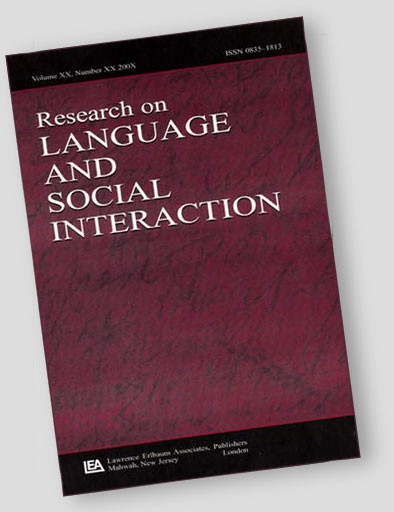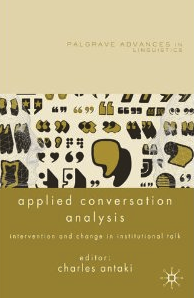|
Recent Publications
Many of these will be available in preprint form from the
Loughborough University Repository.
In Press |
• Antaki, C., Crompton, R. J., Walton, C and Finlay, W M L (forthcoming). How adults with a profound intellectual disability engage others in interaction. Sociology of Health and Illness, xx, xx-xx. |
• Antaki, C, Richardson, E, Stokoe, E.H. and Willott, S. (forthcoming) When police interview victims of sexual assault: Comparing written guidance to interactional practice. In M Mason (Ed.) Discourse of Police Investigation, Chicago: University of Chicago Press. |
| |
2016 |
• Antaki, C., Finlay, W.M.L, Walton, C and Sempik, J (2016). Communication between adults with intellectual disabilities
and support staff. In M. O'Reilly and J. Lester
(Eds.) Handbook of adult mental health: discourse and conversation studies. Basingstoke: Palgrave, pp xx-xx |
| |
2015 |
• Antaki, C., and Crompton, R. J. (forthcoming 2015). Conversational practices promoting a discourse of agency for adults with
intellectual disabilities. Discourse and Society, 26, 645-661 |
• Antaki, C, Richardson, E, Stokoe, E.H. and Willott, S. (2015) Police interviews with vulnerable people alleging sexual assault:
probing inconsistency and questioning conduct. Journal of Sociolinguistics, 19, 328-350 |
• Antaki, C., Richardson, E., Stokoe, E and Willott, C (2015). Dealing with the distress of adults with intellectual impairment
alleging sexual assault and rape. Discourse Studies, 17, 1-18 |
• Antaki, C, Richardson, E, Stokoe, E.H. and Willott, S. (2015) Can people with intellectual disabilities
resist implications of fault when police question their allegations of sexual assault and rape? Intellectual and Developmental Disabilities,
53, 346-357 |
• Antaki, C. and Kent, A (2015). Offering alternatives as a way of issuing directives to children:
putting the worse option last. Journal of Pragmatics, 78, 25-38
An audio-slide synopsis of the paper (takes a moment or two to load):
|
| |
2014 |
• Antaki, C. and O'Reilly, M (2014). Either/or questions in psychiatric assessments:
the effect of the seriousness and order of the alternatives. Discourse Studies, 16 (3), 327-334 |
• Antaki, C. (2014) Repeating a question near-identically may cast the answerer as intellectually
impaired. In L. Greco, L. Mondada & P. Renaud (Eds.) Identités-en-interaction / Identities in Interaction. pp 181-192 |
• Antaki, C. (2014) How practitioners deal with their clients' "off-track" talk. In Graf, E., Sator, M. and
Spranz-Fogasy, T. (eds.) Discourses of Helping Professions. Amsterdam: John Benjamins pp 13-31 |
| |
2013 |
• Antaki, C. (2013) Two conversational practices for encouraging adults with intellectual disabilities to reflect on their activities.
Journal of Intellectual Disability Research 57(6):580-8 |
• Antaki, C. (2013) Recipient-side test questions. Discourse Studies, 15, pp 3-18 |
• Antaki, C. and Finlay, WML. (2013) Trust in what others mean: breakdowns in interaction between adults with intellectual disabilities and support staff.
In Chris Candlin & Jonathan Crichton (Editors) Discourses of Trust. Basingstoke: Palgrave-Macmillan, pp 21-35 |
• Antaki, C. and Wilkinson R. (2013) Conversation Analysis and the Study of Atypical Populations. In T. Stivers and J. Sidnell (Eds.)
Handbook of Conversation Analysis. Blackwell-Wiley, pp 533-550 |
| |
2012 |
• Antaki, C. and Kent, A. (2012) Telling people what to do (and, sometimes, why): contingency, entitlement and
explanation in staff requests to adults with intellectual impairments. Journal of Pragmatics, 44, 876-889 |
• Antaki, C. (2012) Affiliative and disaffiliative candidate understandings. Discourse Studies, 14(5) 531-547 |
• Antaki, C. (2012) What actions mean, to whom, and when. Discourse Studies, 14 493-498 |
• Stokoe, E., Hepburn, A., & Antaki, C. (2012). Beware the "Loughborough School"? Interaction and the politics of intervention.
British Journal of Social Psychology. 51, 486-496 |
• Vayreda, A. and Antaki, C. (2012) To vaccinate or not? The disqualification of commercial sources of health advice in an online forum.
Communication & Medicine. 8, 273-282 |
• Antaki, C. (2012) Seven interactional benefits of physical tasks for adults with intellectual disabilities.
Intellectual and Developmental Disabilities. 50, 311-321 |
| |
2011 |
|
| | |
2010 |
• Antaki, C, and Jahoda, A. (2010) Psychotherapists' practices in keeping a session "on-track" in the face of clients' "off-track" talk. Communication and Medicine, 7, 11-21
|
| |
2009 |
• Vayreda, A and Antaki, C. (2009) Social Support and Unsolicited Advice in an Online Bipolar Disorder Forum. Qualitative Health Research, 19, 931-942
|
• Antaki, C, Finlay, WML, and Walton, C. (2009) Choice for people with an intellectual impairment in official discourse and in practice. Journal of Policy and Practice in Intellectual Disabilities, 6(4) 260-266
| • Finlay, WML, Walton, C and Antaki, C. (2009) Identity at Home: Offering Everyday Choices to People with Intellectual Impairments. In M Wetherell (Ed,) Identities and Social Action - Book Two: Identity Practices. Basingstoke: Palgrave 139-153
|
| |
2008 |
• Antaki, C. (2008) Identities and Discourse. In W. Donsbach (ed.) The International Encyclopaedia of Communication, ICA / Basil Blackwell, pp 2165-2169
|
• Antaki, C. , Finlay, WML, Walton, C and Pate, L. (2008) Offering choice to people with an intellectual impairment: an interactional study. Journal of Intellectual Disability research, 52, 1165-1175.
|
• Finlay, WML, Antaki, C. and Walton, C. (2008) A Manifesto for the Use of Video in Service Improvement and Staff Development in Services for People with Intellectual Disabilities. British Journal of Learning Disability, 36, 227-231
|
• McHoul, A, Rapley, M and Antaki, C. (2008) You gotta light? On the luxury of context for understanding talk in interaction. Journal of Pragmatics, 40, 42-54. |
• Finlay, W M L Antaki, C. and Walton, C. (2008) Saying no to the staff: an analysis of refusals in a home for people with severe communication difficulties. Sociology of Health and Illness, 30, 55-75 |
• Antaki, C, Biazzi, M, Nissen, A and Wagner, J (2008) Managing moral accountability in scholarly talk: the case of a Conversation Analysis data session. Text and Talk, 28 1-30 |
• Finlay, WML, Walton, C and Antaki, C (2008) Promoting choice and control in residential services for people with learning disabilities. Disability and Society, 23, 349-360. |
• Finlay, WML, Antaki, C. , Walton, C and Stribling, P. (2008) The dilemma for staff in "playing a game" with people with a profound intellectual disability. Sociology of Health and Illness,, 30, 531-549. |
• Peräkylä, A., Antaki, C., Vehviläinen, S. and Leudar, I (eds.) (2008) Conversation Analysis of Psychotherapy, Cambridge. England; CUP. |
Conversation Analysis of Psychotherapy

a snip at £45.00 |
• Antaki, C. (2008) Formulations in psychotherapy. In A. Peräkylä, C. Antaki, S Vehviläinen and I Leudar (eds.) Conversation Analysis of Psychotherapy, Cambridge. England; CUP. |
• Peräkylä, A, Antaki, C, Vehviläinen, S and Leudar, I (2008) Conversation Analysis and Psychotherapies. In A. Peräkylä, C. Antaki, S Vehviläinen and I Leudar (eds.) Conversation Analysis and Psychotherapy, Conversation Analysis of Psychotherapy, Cambridge. England; CUP. |
• Vehviläinen, S, Peräkylä, A, Antaki, C, and Leudar, I (2008) A review of the conversational practices of psychotherapy In A. Peräkylä, C. Antaki, S Vehviläinen and I Leudar (eds.) Conversation Analysis of Psychotherapy, Cambridge. England; CUP. |
| 2007 |
• Antaki, C, Finlay, W.M.L., Jingree, T and Walton, C.(2007) "The staff are your friends": conflicts between institutional discourse and practice. British Journal of Social Psychology, 46, 1-18. |
• Antaki, C, Finlay, WML, Walton, C. (2007) Conversational shaping: staff-members' solicitation of talk from people with an intellectual impairment. Qualitative Heath Research, 17, 1403-414 |
• Antaki, C., Leudar, I. and Barnes, R., (2007) ''Members' and Analysts' Analytic Categories: Researching Psychotherapy'', in A. Hepburn & S. Wiggins, (Eds.) Discursive Research in Practice, CUP, Cambridge.
|
• Finlay, W M L, Antaki, C, Walton, C. (2007) On not being noticed: learning disabilities and the non-vocal register. Intellectual and Developmental Disabilities, 45 227-245. |
| |
2006 |
• Antaki, C, "Producing a 'cognition'". Discourse Studies, 2006, 9 - 15 |
• Jingree, T, Finlay, M and Antaki, C. "Empowering words, disempowering actions: an analysis of interactions between staff members and people with learning disabilities in residents' meetings" Journal of Intellectual Disability Research, 2006, 212-226 |
• Antaki, C, Finlay, W M L, Sheridan, E, Jingree, T and Walton, C (2006) "Producing decisions in a self-advocacy group for people with an intellectual disability: two contrasting facilitator styles". Mental Retardation, 2006, 44, 322-343
[More fully-transcribed versions of the extracts in this article are available here] |
| |
2005 |
• Antaki, C., Barnes, R. and Leudar, I., ''Diagnostic formulations in psychotherapy.'', Discourse Studies, 7, 2005, 627-647.
|
• Antaki, C., Barnes, R. and Leudar, I., ''Self-disclosure as a situated interactional practice'', British Journal of Social Psychology, 2005, 44, 1 - 20
|
• Antaki, C., Ardèvol, E., Núñez, F., and Vayreda, A.. "For she who knows who she is": Managing accountability in online forum messages. Journal of Computer-Mediated Communication, 11(1), 2005, http://jcmc.indiana.edu/vol11/issue1/antaki.html
|
| |
2004 |
• Antaki, C., ''Reading minds or dealing with interactional implications?'', Theory and Psychology, 14, 2004, pp 667-683.
|
• Leudar, I., McCabe, R. and Antaki, C., ''Do people with schizophrenia display theory of mind deficits in clinical interactions?'', Psychological Medicine, 34, 2004, pp 401-412.
|
• Antaki, C., Barnes, R. and Leudar, I., ''Trouble in agreeing on a client's problem in a cognitive-behavioural therapy session'', Rivista di Psicolinguistica Applicata, 4, 2004, pp 127-138.
|
• Antaki, C., ''Conversation Analysis'', in Understanding Research Methods for Social Policy and Practice, Becker, S. & Bryman, A. (eds), Policy Press, London, 2004, pp 313-317.
|
• Antaki, C., ''The uses of absurdity'', in Analysing Race Talk: Multidisciplinary Approaches to Interview Discourse, van de Berg, H., Houtkoop, H. & Wetherell, M. (eds), CUP, Cambridge, 2004, pp 85-102. |
| |
2003 |
• Antaki, C., Billig, M.G., Edwards, D. and Potter, J.A., ''Discourse Analysis Means Doing Analysis: A Critique of Six Analytic Shortcomings'', Discourse Analysis Online, 1 Available from: Discourse Analysis Online, 2003. There have been access problems with that site, so here is a downloadable PDF version. |
• That paper is also published in Spanish: ''El análisis del discurso implica analizar: Crítica de seis atajos analíticos'', Athenea Digital, 3, 2003. Available from: http://antalya.uab.es/athenea/num3/antaki.pdf.
|
| |
2002 |
• Antaki, C., Young, N. and Finlay, M., ''Shaping Clients' Answers: Departures from Neutrality in Care Staff Interviews with People with a Learning Disability'', Disability and Society, 17, 2002, pp 435-455.
|
• Antaki, C., ''Personalised revision of 'failed' questions'', Discourse Studies, 4, 2002, pp 411-428.
|
• Antaki, C., ''"Lovely": Turn-initial high-grade assessments in telephone closings'', Discourse Studies, 2002, pp 5-23. |
| |
2001 |
• Antaki, C. and Leudar, I., ''Recruiting the record: using opponents' exact words in Parliamentary argumentation'', Text, 2001, pp 467-488.
|
• Diaz, F. and Antaki, C., ''Análisis de la conversación e intersubjetividad'', in La constitución social de la subjetividad, Crespo, E. & Soldevilla, C. (eds), Catarata, Madrid, 2001, pp 32-48.
|
• Antaki, C. and Diaz, F., ''Analisi de la conversa i processos socials. Un exemple de delicadesa'', in El Llenguatge en les ciences humanes i socials, Íñiguez, L. (ed), Universitat Oberta de Catalunya, Barcelona, 2001, pp 125-137. [also published in Spanish and Portuguese]
|
• O'Brien-Malone, A. and Antaki, C., ''Two approaches to the question "what does the interviewer have in mind"?'', in How to Analyse Talk in Institutional Settings, McHoul, A. & Rapley, M. (eds), Continuum International, London, 2001, pp 173-185
|
| |
2000
|
• Antaki, C., ''Two rhetorical uses of the description 'Chat''', M/C: A Journal of Media and Culture, 3(4), 2000, Available from:
http://journal.media-culture.org.au/0008/uses.php. |
• Antaki, C. and Horowitz, A., ''Using Identity Ascription to Disqualify a Rival Version of events as "Interested"'', Research on Language and Social Interaction, 33, 2000, pp 155-177. |
• Antaki, C., Houtkoop-Steenstra, H. and Rapley, M., ''"Brilliant. Next question..." High-grade assessment sequences in the completion of interactional units'', Research on Language and Social Interaction, 33, 2000, pp 235-262. |
• Antaki, C., ''D'you like a drink? Dissembling language and the construction of an impoverished life'', Journal of Language and Social Psychology, 20, 2001, pp 196-213. |
|






